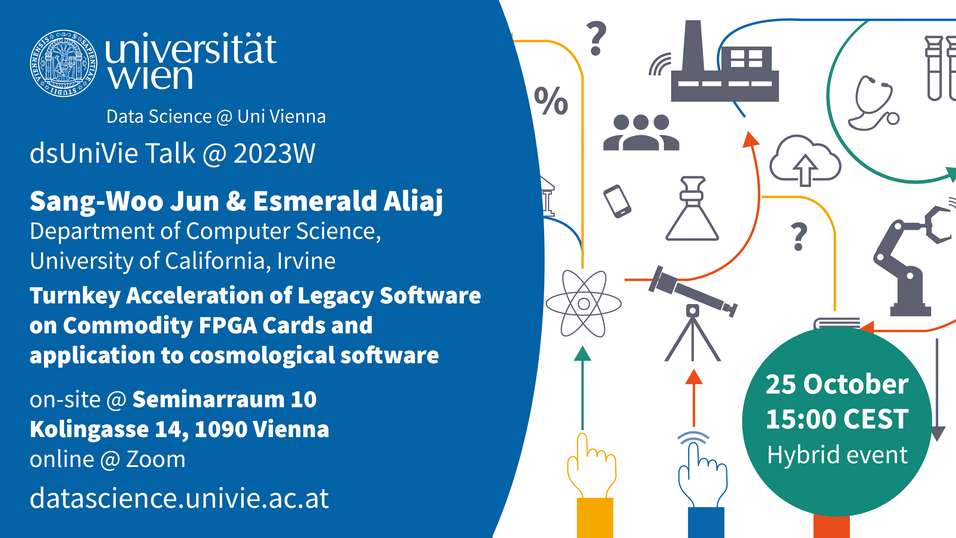Wednesday 25 October 2023 @ 15:00–16:00 CEST
On-site:
University of Vienna
Seminarraum 10
Kolingasse 14–16
1090 Vienna
Online:
Zoom-Link: https://univienna.zoom.us/j/68154688415?pwd=anBCaXlnZ0ZRZ0R2YkV0U2hMSXdIQT09
Meeting-ID: 681 5468 8415
Passcode: 517043
Turnkey Acceleration of Legacy Software on Commodity FPGA Cards and application to cosmological software
Abstract:
Cosmology has historically been a computationally heavy discipline, which is often used in justification for new supercomputer development. Modernly, application-specific hardware acceleration of computation-intensive scientific kernels has provided significant performance and power efficiency improvements over general-purpose software. However, it is difficult and costly to incorporate them into existing software systems.
So far, designing such hardware accelerators using FPGAs or ASICS, as the venerable GRAPE special-purpose computers for n-body simulations, and modifying legacy software to incorporate them, are highly complex tasks. Furthermore, identifying a suitable kernel for acceleration is complicated by the PCIe-attached architecture of commodity FPGA cards, meaning hardware details such as bandwidth and latency overhead must be considered for software kernel selection.
As a remedy to these challenges, we present the current state of our FarSlayer project, a high-level source-to-source compiler for end-to-end acceleration of legacy software.FarSlayer analyzes previously existing legacy software code and emits an accelerated version of it, where the kernel is automatically selected considering data movement over PCIe. The entire process is automatic, meaning the domain scientist does not necessarily need to understand the existing code, or reason about hardware development. We demonstrate FarSlayer on using physically relevant software, such as the n-body codes Gizmo and Nemo, and the General Relativity ray tracer Gyoto, and demonstrate it can automatically achieve significant performance improvements.
Biographies:
Sang-Woo Jun is an Assistant Professor at the University of California, Irvine. He earned his Ph.D. in Electrical Engineering and Computer Science at the Massachusetts Institute of Technology, and his B.S. in Electrical and Computer Engineering at Seoul National University. His main interests are the design of architectures for low-cost high-performance computing and reconfigurable hardware accelerators.
Esmerald Aliaj is a fourth year PhD student at the University of California, Irvine, working with prof. Sang-Woo Jun. Prior to that he was awarded an MSc from the same university, focused on applied security, and another MSc from the University of Athens focused on Distributed Systems and Optimization. His main interests are compilers, high-performance scientific computing, and distributed systems.

